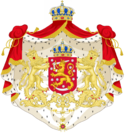Politics of Nidwalden: Difference between revisions
No edit summary |
No edit summary |
||
| Line 1: | Line 1: | ||
{{Template:Politics of Nidwalden}} | {{Template:Politics of Nidwalden}} | ||
The ''Politics of Nidwalden'' take place within the framework of a {{wp|Parliamentary system|parliamentary}}, {{wp|representative democracy}} and a {{wp|constitutional monarchy}} in which the monarch of Nidwalden, the Grand Duke [], is head of state and the Prime Minister, [[Carlotte Mann]] the head of government. Nidwalden is widely known for having one of the most transparent democracies and large respect for the freedom of speech and expression, as well as an international recognition for having a culture of serious politics in which parties seek common striving for broad consensus on important issues. | The '''Politics of Nidwalden''' take place within the framework of a {{wp|Parliamentary system|parliamentary}}, {{wp|representative democracy}} and a {{wp|constitutional monarchy}} in which the monarch of Nidwalden, the Grand Duke [], is head of state and the Prime Minister, [[Carlotte Mann]] the head of government. Nidwalden is widely known for having one of the most transparent democracies and large respect for the freedom of speech and expression, as well as an international recognition for having a culture of serious politics in which parties seek common striving for broad consensus on important issues. | ||
Executive power is exercised by the cabinet of Nidwalden, which is elected and presided by the Prime Minister, although during cabinet meetings, Ministers and Prime Minister hold equal power. Legislative power is vested in the Parliament of Nidwalden (''Nidwaldeser Parlament''), a {{wp|unicameralism|unicameral legislature}} whose seat is in the capital city of [[Cologne]]. The judiciary power is structured hierarchically with the [[Supreme Court]] at the apex followed by the District Courts in each county, members are nominated by the executive and formally appointed by the monarch. | Executive power is exercised by the cabinet of Nidwalden, which is elected and presided by the Prime Minister, although during cabinet meetings, Ministers and Prime Minister hold equal power. Legislative power is vested in the Parliament of Nidwalden (''Nidwaldeser Parlament''), a {{wp|unicameralism|unicameral legislature}} whose seat is in the capital city of [[Cologne]]. The judiciary power is structured hierarchically with the [[Supreme Court]] at the apex followed by the District Courts in each county, members are nominated by the executive and formally appointed by the monarch. | ||
Revision as of 01:50, 2 May 2019
 |
|---|
| This article is part of a series on the politics and government of Nidwalden |
|
|
The Politics of Nidwalden take place within the framework of a parliamentary, representative democracy and a constitutional monarchy in which the monarch of Nidwalden, the Grand Duke [], is head of state and the Prime Minister, Carlotte Mann the head of government. Nidwalden is widely known for having one of the most transparent democracies and large respect for the freedom of speech and expression, as well as an international recognition for having a culture of serious politics in which parties seek common striving for broad consensus on important issues.
Executive power is exercised by the cabinet of Nidwalden, which is elected and presided by the Prime Minister, although during cabinet meetings, Ministers and Prime Minister hold equal power. Legislative power is vested in the Parliament of Nidwalden (Nidwaldeser Parlament), a unicameral legislature whose seat is in the capital city of Cologne. The judiciary power is structured hierarchically with the Supreme Court at the apex followed by the District Courts in each county, members are nominated by the executive and formally appointed by the monarch.
Nidwalden has a multi-party system, however, during its history, it has had two leading parties, Rechte and the Nationalist Party traditionally, and Rechte and the Social Democrat Party nowadays. There are significant minor parties that create a wide range of options during elections and hold more power in local elections like the Green Party (Grüne Partei) and Alternative ( Die Alternative). Since the early twentieth century, Nidwalden has gone through the introduction of a Nidwaldester welfare state and the 9 April 1920 members of all the parties signed the Sankt Moritz Agreement, since then, politicians have opted for co-operation to reach concensus on national issues.
The democratic culture of Nidwalden is seen on the direct democracy mechanisms of which the Government relies on. Mandatory referendum and optional referendum exist for changes on the constitution and on laws respectively and in addition, people can ask for referendums to impulse laws on Parliament. Political institutions enjoy a large satisfaction from the Nidwaldester people and these are widely recognised as some of the most transparent in Lorecia and Astyria.